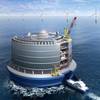North Sea Rigs Evacuated on Explosion Risk
Total SA’s Elgin platform leaked gas for a third day in the U.K. North Sea, and neighboring rigs were evacuated to guard against the risk of an explosion.
Total, France’s largest oil company, may drill an emergency well to stem the leak and has halted work at a nearby field to free up a rig, David Hainsworth, a health, safety and environment manager for Total, said today by phone from Aberdeen, Scotland, that drilling a relief well to intercept the leak would take a “minimum of six months.”
The platform was evacuated and production halted after a “well control problem” caused a leak on March 25. Total has flown in outside experts to help stem the flow of fuel, which prompted Royal Dutch Shell Plc. to move staff from its neighboring Shearwater field. The Elgin and Franklin fields, which send oil and gas through the platform, supply about 15 percent of Forties crude, the biggest component of Dated Brent used to price more than half of the world’s oil.
As well as gas, about 23 metric tons of condensate, a type of light oil, has been released from the leak above the water on the platform, said Brian O’Neill, a Total spokesman in Aberdeen. A cloud can be seen rising above the platform, Hainsworth said.
Total said the well causing the leak remained plugged, and gas was coming from a smaller reservoir nearer to the surface. The leak may exhaust itself naturally, Hainsworth said.
Condensate was released into the sea, causing a “sheen” of 2 miles by 0.75 miles yesterday, which has grown since then, he said. There is an exclusion zone in place of 2 miles for shipping and 3 miles for aircraft.
It’s a “serious incident,” said Tom Whittles, an Edinburgh- based spokesman for the Scottish government. Still, it won’t have a “strong environmental impact on the area,” as the condensate will probably evaporate, he said.
Outside technicians from Houston are helping the effort to stop the leak, and other North Sea operators have offered assistance, O’Neill said, declining to identify the companies.
The incident occurred during efforts to plug and abandon a well, an official at the Department of Energy and Climate Change said today by telephone, declining to be identified, in line with policy. Pressure began rising during the process, causing a “blow-out,” Hainsworth said.
The Elgin-Franklin fields produced a daily average of 61,386 barrels of condensate in November, the most recent government data show, according to Bloomberg calculations. That’s about 15 percent of all Forties shipments that month, loading data show. Shareholders in both fields include Eni SpA, BG Group Plc, EON AG, Exxon Mobil Corp., Chevron Corp, Dyas AS and Summit Petroleum Ltd.
“The Forties crude oil stream should be affected by the problems Total currently has,” said Olivier Jakob, managing director of Zug, Switzerland-based Petromatrix GmbH.
Elgin produces 5.5 million cubic meters of gas a day and Franklin 7.8 million cubic meters, according to Mark Ironside, a Total spokesman in Aberdeen.
Condensate from the fields is exported through the Forties pipeline to Scotland’s Kinneil terminal. Gas is pumped via BP Plc.’s Unity Riser into the Bacton Seal terminal in eastern England, operated by Shell, according to Total’s website.
Shell carried out a “partial evacuation” of staff from its Shearwater oil and gas field as precaution, said Ross Whittam, a Shell spokesman. Shearwater is about 4 miles (6.4 kilometers) from Elgin. Output from the Scoter and Starling fields, which passes through the Shearwater platform, hasn’t been affected, Whittam said. Drilling operations at the Noble Hans Duel drilling rig have also been suspended as a precaution, he said. (Bloomberg)












